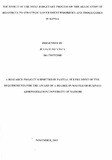| dc.description.abstract | The main objective of the study was to determine the effect of the MTEF budgetary process on
the allocation of resources to strategic government priorities in Kenya. To achieve the objective,
the study examined whether allocation of resources to strategic government priorities is
influenced by the main targets of MTEF budgetary process which include macro targets
prediction! estimation, determination of sectorial priorities and financial programming. The study
adopted a descriptive survey. Data was collected from Heads of Finance Departments in the
ministries by the use of a questionnaire. Data was coded into Statistical Software for Social
Sciences and analyzed using descriptive and inferential statistics. The study established that
MTEF has improved allocation of resources to strategic government priorities. Resources
allocation to strategic government priorities has been enhanced through macro targets prediction!
estimation, determination of sectoral priorities and financial programming as stipulated in the
MTEF. The improvements have been on a moderate scale and the budgetary process is yet to
reap full benefit of MTEF. Kenya is making progress in ensuring that strategic priorities are
identified in all sectors and line ministries and ensuring that resource allocation is proportional to
the level of prioritization attached to government programmes. MTEF has not been particularly
effective in prediction and estimation of desired level of domestic borrowing in Kenya,
preparation and approval of macro-fiscal framework, decision making on indicative sector
resource ceiling, budgetary predictability, integration of policy, planning and budgeting and
adherence to a budget process that starts with a top down consideration of macroeconomic
outcomes, fiscal outcomes and robust revenue projections. The study recommends review of
policies guiding estimation of desired level of domestic borrowing in Kenya, effective
implementation of MTEF procedures on preparation and approval of macro-fiscal framework
through a sequenced process that align input by different actors to ensure availability of
information and expertise, better resource allocation through adherence guidelines on sector
resource ceiling outlined in MTEF, greater budgetary predictability through commitment to more
credible sectoral budget ceilings and integration of policy, planning and budgeting within a
medium term perspective during allocation of resources to strategic Government programmes,
and further research on factors that influence allocation of resources to strategic government
priorities in Kenya. | en_US |

